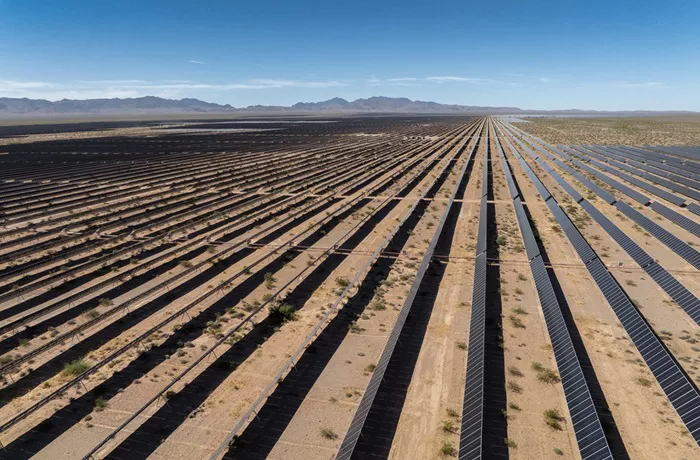A groundbreaking solar-plus-storage initiative valued at over $2.33 billion is set to commence in Nevada following the recent approval of a Record of Decision (ROD) from the U.S. Department of the Interior.
Arevia Power announced today that the Libra Solar Project will move forward, featuring 700 megawatts (MW) of solar power generation capacity coupled with 700 MW of battery energy storage. The project will be developed on approximately 5,800 acres of public land located about 20 miles south of the Fort Churchill substation in Yerington, Nevada, roughly 70 miles south of Reno. This area is managed by the Bureau of Land Management (BLM).
The BLM has been exploring 31 million acres of public lands in the western U.S. for potential solar development, underscoring the growing emphasis on renewable energy projects.
The Libra Solar Project is projected to generate 1,948,000 megawatt-hours (MWh) of electricity annually. The ROD authorizes the right-of-way grant for the construction and operation of the solar photovoltaic facility and associated infrastructure. The project’s innovative design is expected to provide a reliable power supply throughout the year, offering significant benefits to rural communities in Nevada.
Arevia Power plans to sell the electricity produced by the Libra project to NV Energy under a 25-year power purchase agreement.
Economic Impact and Support
“This project exemplifies how renewable energy can drive economic growth while tackling climate change,” said U.S. Representative Steven Horsford of Nevada. “The Libra Solar Project will create over 1,000 well-paying jobs in Mineral and Lyon counties and deliver enduring benefits to our communities. I am excited to see Nevada at the forefront of renewable energy innovation.”
Founded in 2015, Las Vegas-based Arevia Power is a prominent developer of utility-scale solar and wind projects across the U.S., with more than 12 gigawatts (GW) of renewable assets developed primarily on federal and state lands. The company previously worked on the Gemini Solar + Storage Project in Nevada.
Kenneth Cooper, International President of the International Brotherhood of Electrical Workers (IBEW), praised the initiative: “The Libra Solar Initiative represents more than just progress towards a sustainable future; it creates substantial economic opportunities for Nevadans. By generating high-paying jobs and upholding strong labor standards, we are investing in both renewable energy infrastructure and the prosperity of our communities. This project highlights the success of the Biden-Harris administration’s renewable energy tax credits and labor standards.”
BLM’s role in the project has been crucial. Ricardo Graf, Chief Development Officer and Managing Partner at Arevia Power, acknowledged the support of Nevada BLM Director Jon Raby and Carson City District Manager Kim Dow for their leadership in advancing the Libra Solar Initiative. “Their dedication has been instrumental in ensuring that we continue to make a positive impact on both the environment and the communities we serve,” Graf said.
Jon Raby, BLM Director, added, “We are proud of our collaboration on the Libra Solar project, which will bring employment opportunities to Nevada and contribute to the state’s renewable energy advancement.”
Construction of the Libra project is expected to begin shortly, with commercial operations slated to start by the end of 2027. The power generated will be transmitted via NV Energy’s 525-kilovolt Greenlink West transmission line, running approximately 350 miles from Yerington to Las Vegas, and is anticipated to be operational by mid-2027.
According to NV Energy’s integrated resource plan submitted to the Nevada Public Utilities Commission, the utility will pay $34.97 per MWh for energy and portfolio credits, with no price escalation over the contract’s duration. The capacity price for the storage component of the agreement is set at $13,350 per MW per month for 20 years, with no additional costs for the remaining five years. The levelized cost of energy, including network upgrade costs, is projected to be $93.69 per MWh.
Related topics:
- Deutz Expands Its Reach in Poland with Acquisition of Leading Dealer BTH FAST
- Baudouin Unveils Cutting-Edge 8F21 Marine Engine at Hamburg’s SMM Trade Fair
- Karin Rådström Appointed CEO of Daimler Truck Holding

